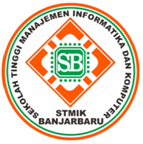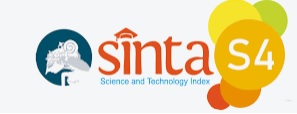Algoritme Multinomial Naïve Bayes Pada Aplikasi Chatbot Layanan Informasi Berbasis Teks
Abstract
The existence of Customer Service (CS) officers whose number is not balanced with the number of students served, has resulted in a decrease in the level of satisfaction with campus services. This study aims to create a chatbot application that can help with CS tasks. This text-based chatbot application was created using a Natural Language Processing (NLP) approach and a Machine Learning algorithm. NLP is used to process a text question from the user, while the MultinomialNB machine learning algorithm is used to find the appropriate data. If found, the system will answer the question based on the label obtained from the machine learning model. The dataset used as Chatbot training data is in the form of data on questions that are often asked by students in the CS section, and 120 questions in the questionnaire which are divided into 10 labels or classes. The test is carried out using 60 conversations that are different from the dataset but have the same purpose. From 60 chatbot conversations, 50 conversations answered correctly and 10 conversations were wrong. The test results show good results, namely having a modeling accuracy of 98% and 84% test data.
Keyword : Chatbot; Natural Language Processing; Machine Learning; Supervised Learning; Multinomial Naïve Bayes.
Â
Abstrak
Keberadaan petugas Customer Service (CS) yang jumlahnya tidak berimbang dengan jumlah mahasiswa yang dilayani, mengakibatkan tingkat kepuasan pelayanan kampus menjadi berkurang. Penelitian ini bertujuan untuk membuat aplikasi chatbot yang bisa membantu tugas CS. Aplikasi chatbot berbasis teks ini dibuat dengan pendekatan Natural Language Processing (NLP) dan algoritme Machine Learning. NLP digunakan untuk memproses sebuah pertanyaan teks dari pengguna, sedangkan algoritma machine learning MultinomialNB digunakan untuk mencari data yang sesuai. Jika didapatkankan maka sistem akan menjawab pertanyaan tersebut berdasarkan label yang didapatkan dari model machine learning. Dataset yang digunakan sebagai data latih Chatbot berupa data pertanyaan yang sering ditanyakan mahasiswa di bagian CS, dan 120 pertanyaan dalam kuisioner yang dibagi kedalam 10 label atau kelas. Pengujian dilakukan dengan menggunakan 60 percakapan yang berbeda dengan dataset tetapi mempunyai maksud yang sama. Dari 60 percakapan Chatbot berhasil menjawab dengan tepat sebanyak 50 percakapan dan jawaban salah sebanyak 10 percakapan. Hasil pengujian menunjukkan hasil yang baik yaitu mempunyai akurasi pemodelan 98% dan data test 84%.
Kata kunci: Chatbot; Natural Language Processing; Machine Learning; Supervised Learning; Multinomial Naïve Bayes.
References
Wu, B., Wang, B. and Xue, H. “Ranking responses oriented to conversational relevance in chat-botsâ€. In Proceedings of COLING 2016, the 26th International Conference on Computational Linguistics: Technical Papers, pp. 652-662. Osaka, Japan, 2016
F. Mustakim, Fauziah & N. Hayati. “Algoritma Artificial Neural Network pada Text-based Chatbot Frequently Asked Question (FAQ) Web Kuliah Universitas Nasionalâ€. Jurnal JTIK (Jurnal Teknologi Informasi dan Komunikasi), vol. 5, no. 4, pp. 438-446, 2021
V.R. Prasetyo, N. Benarkah & V.J. Chrisintha. “Implementasi Natural Language Processing Dalam Pembuatan Chatbot Pada Program Information Technology Universitas Surabaya“. TEKNIKA, vol. 10, no. 2, pp. 114-121, Juli 2021
K.A. Nugraha, D. Sebastian. “Chatbot Layanan Akademik MenggunakanK-Nearest Neighborhoodâ€. Jurnal Sains dan Informatika, vol. 7, no. 1, pp. 11-19, Juni 2021
R.C. Hutama, Fauziah &, R.T. Komalasari. “Aplikasi Chatbot Berbasis teks menggunakan Algoritma Naive Bayes Classifier Faq Grabadsâ€. STRING (Satuan Tulisan Riset dan Inovasi Teknologi), Vol. 6 No. 1, pp. 90-97, Agustus 2021
S. Qaiser, R. Ali, “Text Mining: Use of TF-IDF to Examine the Relevance of Words to Documentsâ€. International Journal of Computer Applications, Vol. 18 no. 1, pp. 25-29, July 2018
H. Christian, M.P. Agus & D. Suhartono, “Single Document Automatic Text Summarization Using Term Frequency-inverse Document Frequency (TFIDF)â€. ComTech: Computer, Mathematics and Engineering Applications, Vol. 7, no. 4, pp. pp. 285-294, 2016
G. Singh, B. Kumar, L. Gaur, and A. Tyagi, “Comparison between Multinomial and Bernoulli Naïve Bayes for Text Classification,†Int. Conf. Autom. Comput. Technol. Manag. ICACTM 2019, pp. 593–596, 2019
M.A. Hakim & S. Nurhayati, “Pembangunan Aplikasi Chatbot Midwify sebagai Media Pendukung Pembelajaran Ilmu Kebidanan Berbasis Android di Stikes Bhakti Kencana Bandung. Komputikaâ€, Jurnal Sistem Komputer, Vol. 8, no. 1, pp. 45-52, 2019
E.A. Lisangan, “Natural Language Processing Dalam Memproses Informasi Akademik Mahasiswa Universitas Atma Jaya Makassarâ€. Jurnal TEMATIKA, Vol. 1, no. 1, pp. pp. 1-9, 2021
A.B. Rianto, E.P. Mutiara, Wibowo, and P. I. Santosa, “Improving the accuracy of text classification using stemming method, a case of non-formal Indonesian conversation,†Journal of Big Data, vol. 8, no.1, pp. 1-16, 2021
Yuyun, N. Hidayah, S. Sahibu “Algoritma Multinomial Naïve Bayes Untuk Klasifikasi Sentimen Pemerintah Terhadap Penanganan Covid-19 Menggunakan Data Twitterâ€, Jurnal Resti, V ol. 5 No. 4, pp 820 - 826 , 2021
Xu. Shuo, Li. Yan & Z. Wang,†Bayesian Multinomial Naïve Bayes Classifier to Text Classificationâ€, International Conference on Multimedia and Ubiquitous Engineering, pp 347–352, 2017
M. Abbas, K.A. Memon, A.A. Jamali, S. Memon, A. Ahmed.†Multinomial Naive Bayes Classification Model for Sentiment Analysisâ€, IJCSNS International Journal of Computer Science and Network Security, VOL.19 No.3, pp. 62-71, March 2019
L. Dey, S. Chakraborty, A. Biswas, B. Bose, and S. Tiwari, “Sentiment Analysis of Review Datasets Using Naïve Bayes‘ and K-NN Classifier,†Int. J. Inf. Eng. Electron. Bus., vol. 8, no. 4, pp. 54–62, 2016.
A.A. Farisi, Y. Sibaroni, S.A. Faraby. â€Sentiment analysis on hotel reviews using Multinomial Naïve Bayes classifier†Journal of Physics: Conference Series, Volume 1192, no. 1, p. 012024, 2019
How To Cite This :
Refbacks
- There are currently no refbacks.










